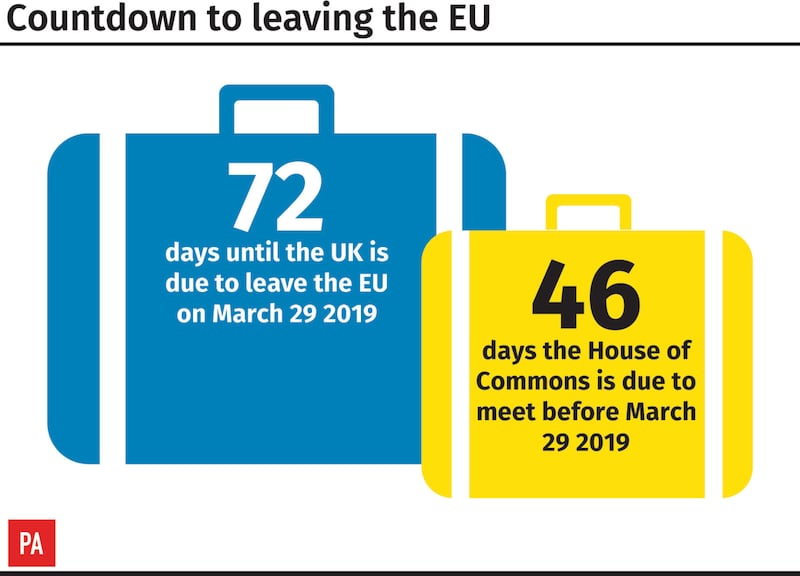The taoiseach has faced accusations that his party is not telling the public the full truth about the impact of a no-deal Brexit.
Leo Varadkar was taking questions from opposition leader Micheál Martin after a tape emerged of Tánaiste Simon Coveney admitting that checks on goods moving between the UK and Ireland will be necessary in the event of a no-deal Brexit.
In a private conversation between Transport Minister Shane Ross and Mr Coveney on Tuesday night, Mr Coveney suggested that ministers should not talk about border checks publicly.
The Fianna Fáil leader called for the government to be honest with the public about the potential consequences of the UK crashing out of the EU.
Read More:
- Mixed reaction to Brexit vote defeat from Northern Ireland politicians
- Brexit vote result increases risk of UK crashing out of EU, warns Dublin government
- Sinn Féin urges Leo Varadkar to 'stand firm' after Westminster rejects Brexit deal
- Arlene Foster says UK Parliament right to reject Brexit deal
During leaders' questions, Mr Martin said: "Yesterday's exchange between the tánaiste and the minister for transport are deeply worrying because it suggests the public are not being told the full truth for party political reasons."
A newspaper reported that the tánaiste told Mr Ross: "But once you start talking about checks anywhere near the border, people will start delving into that and all of a sudden we'll be the government that reintroduced a physical border on the island of Ireland."
Mr Martin told the Dáil it appears there is a "private understanding and knowledge" within government about a border in the aftermath of no-deal Brexit, but "at all costs that private understanding not be shared with the public".
The Irish Premier Leo Varadkar has labeled Brexit “a problem that started in Westminster” and called on the British Government to come up with a solution. pic.twitter.com/JBSMz2bQlv
— aoife-grace moore. (@aoifegracemoore) January 16, 2019
Mr Varadkar denied his government was planning for border checks , and for checks in the sea.
He said: "I can't imagine how you would carry out checks in the middle of the sea, I think they can only be done at ports and airports.
"I think his (Mr Coveney's) only genuine concern is that if you use the wrongs words or say things in the wrong way, people will misinterpret that as if you have some sort of secret plan to impose a hard border.
Read More
- Brexit deal defeat sparks fresh hard border fear
- Focus in Ireland, north and south, remains on the backstop
- Brexit: What Happens Next?
- Brexit dominating Dáil's spring programme
"We have no such secret plan."
Fianna Fáil Brexit spokeswoman Lisa Chambers said she had been assured by the government there has been no planning for a hard border.
Speaking to the media, she said: "I've asked the Tanaiste more than once, directly, face to face, 'have you done any contingency planning for a border on this island' and I have been told unequivocally absolutely not.
"I have to take government at their word on that."
Taoiseach Leo Varadkar says a no-deal #brexit would mean there's no guarantee on avoiding a hard border, says must do all to avoid a no-deal BUT "not one that compromises our fundamental positions."
— Darran Marshall (@DarranMarshall) January 16, 2019
Adds that any UK solution must be acceptable to Ireland & EU as a whole. pic.twitter.com/1YVUXvAXj7
Sinn Féin leader Mary Lou McDonald told the Dáil there was an "unmissable hostility" to Irish interests in some sections of British political establishment.
Ms McDonald also referred to a comment from DUP leader Arlene Foster, who said there had never been a hard border between the Republic and the north.
She said: "That is manifestly not true and it illustrates clearly that Brexiteers don't deal with reality.

"With every date that passes we lurch closer to the possibility, to a no-deal scenario and return of that hard border.
"The reality is in the absence of backstop, there will be a hard border and there will be checks."
Mr Varadkar said he "remembers very well" the hard border that existed during the Troubles.
He added: "There were customs checks, I remember the 24-hour rule and I remember seeing soldiers and I never want to see those things ever again on our island.
"It's not good enough for those who rejected the agreement to say there won't be a hard border just because no one wants one," he added.
"It is now up to those who rejected that deal to come up with an alternative solution to honour their commitment to avoiding a hard border."






